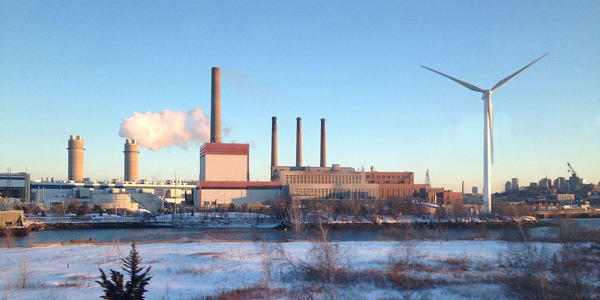FERC clarified some aspects of its orders approving ISO-NE’s cost-of-service contract with Exelon’s Mystic Generating Station and ordered the company to make additional compliance filings in three rulings Thursday.
The RTO signed the two-year, $400 million contract to preserve the region’s reliability after Exelon announced plans to shutter the plant when its existing capacity supply obligations expire in 2022.
The commission on Thursday granted limited clarifications on its July 2018 (ER18-1639-001) and December 2018 orders (ER18-1639-002) approving ISO-NE’s agreement for Mystic Units 8 and 9, including payments to the company’s Everett LNG facility. (See FERC Approves Mystic Cost-of-Service Agreement.)
Supporting the rulings were Chairman Neil Chatterjee and Commissioners Bernard McNamee and James Danly. Commissioner Richard Glick, who had opposed the 2018 orders, dissented.
In ruling on rehearing requests on the July order, the commission granted the Massachusetts attorney general’s request for clarification that Mystic must prove its capital expenditures are just and reasonable to recover their costs.
Authority over LNG Terminal Challenged
But the commission majority disagreed with contentions by the AG and New Hampshire Public Utilities Commission that FERC had asserted jurisdiction over Exelon’s Everett LNG facility — the sole source of Mystic’s fuel — by approving the power plant’s fuel costs.
“Review and approval of the fuel supply charge … can include consideration of whether it is just and reasonable for Mystic to include in its rates charges traceable to specific costs that Everett incurred and that are included in the fuel supply charge. The commission’s findings may affect or have implications for Everett but do not constitute an assertion of jurisdiction over (i.e., regulation of) Everett or Everett’s incurrence of costs,” the commissioners said. “We thus disagree with the New Hampshire PUC that the commission is proposing to regulate the rates of an LNG import terminal.”
In his dissent, Glick said, “I do not believe that the commission can or should use its authority over wholesale sales of electricity to bail out a liquefied natural gas import facility. …
“Because Everett does not rely on the interstate pipeline grid to acquire natural gas (instead receiving it via ship), it can provide another source of natural gas for the region when the pipeline system becomes constrained, as may happen during stretches of cold weather when heating needs cause demand for natural gas to surge. But Everett apparently depends on its sales to Mystic to remain financially solvent, and letting Mystic retire could indirectly lead Everett to close,” Glick wrote. “It is Everett, not Mystic, that, in fact, provides the purported fuel security benefit underlying this proceeding. Accordingly, the commission has chosen to use its authority under the [Federal Power Act] to retain Mystic in order to keep Everett from going under.”
December 2018 Order
In ruling on challenges to the December 2018 order, the commission rejected concerns regarding anticompetitive behavior as beyond the scope of the proceeding.
“For similar reasons, we find that the issues raised on rehearing about market manipulation and the general functioning of natural gas and electric markets also are beyond the scope of this proceeding. Thus, the commission did not err in failing to take into account potential market manipulation as it relates to the Mystic agreement because sufficient protections exist to protect against this behavior. We reiterate that the commission will continue to monitor, as always, the New England natural gas and electricity markets during the term of the Mystic agreement for anticompetitive behavior and market manipulation.”
The commission rejected Mystic’s claim that a true-up mechanism was unnecessary to protect consumers. “We continue to find that the true-up requirement is not administratively inefficient; rather, it is appropriately transparent to render the rate just and reasonable,” FERC said.
But the commission granted Mystic’s request for clarification regarding the timing of capital expenditure projects.
Clawback Mechanism
In a third order, the commission accepted in part Mystic’s compliance filing on true-up and clawback mechanisms but required the company to make an additional filing regarding the accounting for its purchase price of the plant (ER18-1639-003). The clawback mechanism would require Mystic to refund capital expenditures if the generator chooses to continue participating in ISO-NE’s markets after the termination of the cost-of-service contract.
In a bid to extend Mystic’s contract for an additional year, Exelon last month accused ISO-NE of violating its Tariff by prematurely culling bids received in response to its Boston competitive transmission solicitation. (See Exelon Challenges ISO-NE RFP in Bid to Extend Mystic.)





